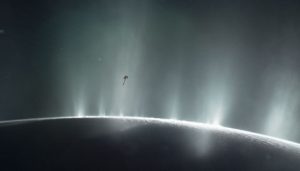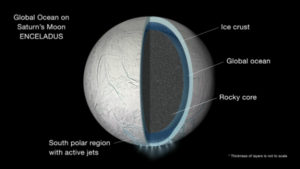A lack of dry land on moons such as Europa and Enceladus might make it difficult to seed oceans with phosphorus, an element essential for life as we know it.

NASA/JPL-Caltech
In the hunt for life, water reigns supreme, a key ingredient to life as we know it. Energy is also an essential ingredient, required to drive the chemical reactions that life depends on. But new research takes a look at an oft-forgotten ingredient: the elements that limit life's possibility. Because of the limited availability of these elements, water worlds such as Saturn's moon Enceladus and Jupiter's satellite Europa may not be as habitable as previously thought.
Both Europa and Enceladus contain an ocean beneath an icy crust, and simulations suggest that they should have energy sources such as geothermal vents on their ocean floors. This combination has made these moons tantalizing targets in the hunt for life.
But their global oceans may be their downfall. According to Manasvi Lingam and Avi Loeb (Harvard University), the abundance of phosphorus creates a chokepoint for life on the two worlds. Although considered one of the six most important elements that make up biological processes on Earth, phosphorus is primarily produced or released by interactions with dry land, something sorely missing in ice-covered worlds. The other five key elements are carbon, hydrogen, nitrogen, oxygen, and sulfur.
"Based on Earth's evolutionary and geological history, there are grounds to believe that phosphorus is the limiting element," Lingam says. "It's been called 'the ultimate living nutrient' because it limits how much biomass the biosphere can have."
As one of the ingredients of the energy-storage molecule adenosine triphosphate, phosphorus plays a key role in metabolism. A sugar-phosphate backbone forms the structural framework of DNA and RNA, two other essential components for life as we know it. Phosphorus even makes up the membrane that holds the cell together and acts as a gatekeeper, allowing helpful molecules to pass through while serving as a barrier for harmful material.
The rocky material of the solar system contains phosphorus and other elements, trapping them in geological sinks until they are released. On Earth, phosphorus is primarily carried to the oceans through erosion. Rivers wear down the continental rocks, and wind carries bits of phosphorus that are lying on the surface or spewed from volcanoes. Neither of these methods work for Enceladus or Europa, where the atmospheres are almost nonexistent and dry land doesn't exist.

NASA / JPL-Caltech
Instead, the ocean worlds would most likely pick up phosphorus from the ocean floor as the water gradually wears away at the rock. The process is significantly slower than erosion by the more acidic river water, allowing less of the element to seep into the ocean over time. In their paper, published September 12th in the Astronomical Journal, Lingam and Loeb found that far less phosphorus enters the oceans of Enceladus and Europa compared to Earth.
"Life [on Enceladus and Europa] is likely to be depleted by orders of magnitude relative to Earth," Loeb says. "They could have some form of life, but it may not be as complex on Earth…the rate at which the complexity of life develops would be slowed down significantly."
That doesn't mean that missions to explore the worlds, such as NASA's upcoming Europa Clipper mission to orbit Jupiter's moon, should be killed, the pair clarified. Understanding these environments can help scientists put limits on how life evolves on the moons and on Earth. Currently, Lingam says, scientists don't know how much phosphorus is required for life on Earth, much less on other worlds.
That lack of knowledge is another reason to press forward in investigating the icy satellites. "The biggest problem in trying to constrain or understand whether life could exist in these environments is that we don't know very much," says Morgan Cable (Jet Propulsion Laboratory), who was not part of the research. "Until we have better constraints on key properties like phosphorus, it can be challenging to draw firm conclusions based on nutrient availability."
While drilling into the subsurface oceans may not happen for decades, Europa and Enceladus may provide more immediate hints about what's going on in their oceans, including the chance to measure how much phosphorus they carry in their water. Enceladus jets water from its southern pole, and at least one geyser has been tentatively spotted over Europa. As future missions prepare to probe these fountains, they can carry instruments that might search for limiting elements such as phosphorus.
"I just think we need to be careful with what kind of instruments we carry," Lingam says.
Reference:
M. Lingam and A. Loeb. "Is Extraterrestrial Life Suppressed on Subsurface Ocean Worlds due to the Paucity of Bioessential Elements?" Astronomical Journal. September 12, 2018.
 4
4









Comments
misha17
October 4, 2018 at 2:44 pm
What about the idea of phosphorous entering the water via the hydrothermal vents? Granted, phosphorous would probably be limited to the area around the vents, but those areas would be rich in other minerals vital to life, dissolved from the rocks by the hot water in the vents. It would be like the "islands" of life clustered around similar vents at the bottom of Earths' oceans.
You must be logged in to post a comment.
Anthony Barreiro
October 4, 2018 at 3:48 pm
"The biggest problem in trying to constrain or understand whether life could exist in these environments is that we don't know very much," says Morgan Cable (Jet Propulsion Laboratory) ... .
I hereby nominate Dr. Cable for the Yogi Berra Prize in Epistemology.
You must be logged in to post a comment.
Tom Hoffelder
October 6, 2018 at 6:32 pm
Humans have this insatiable need to expect/believe/find life somewhere/anywhere else but here. Because of that, they ignore/dismiss problems like this phosphorous one. They ignore/dismiss all the clues. 1) After 40 years, SETI has nothing, even though the searches are becoming more and more advanced, 2) ET should have been here by now according to one of the smartest guys ever, Enrico Fermi, 3) All life on earth, from slime molds to maples to mollusks to mammals, has ONE SINGLE common ancestor; in other words, in 4 billion years, complex life (single cell) originated ONLY ONCE, and 4) everyone needs to read the book Rare Earth: Why Complex Life is Uncommon in the Universe, 2000, Peter D. Ward (paleontologist) and Donald E. Brownlee (doctorate of astronomy).
"For an eternal 4 billion years, through extremes of environmental and ecological change, bacteria changed their genes and biochemistry, but never changed their form. They never gave rise to more complex life forms, of the kind we might hope to detect on another planet, intelligent aliens - EXCEPT JUST ONCE." ~ The Vital Question: Evolution, and the Origins of Complex Life, 2015, by Nick Lane (https://en.wikipedia.org/wiki/Nick_Lane).
“I think we can reasonably conclude that complex life will be rare in the universe – there is no innate tendency in natural selection to give rise to humans or any other form of complex life. It is far more likely to get stuck at the bacterial level of complexity.” ~ The Vital Question, by Nick Lane
You must be logged in to post a comment.
Anthony Barreiro
October 9, 2018 at 6:24 pm
Lots of people believe that life, and even complex life, must be very common in the universe. Some people believe that life, or at least complex life, is rare, or even unique to planet Earth. Persuasive arguments can be made for both of these beliefs, but neither has been proven. At this point, the null hypothesis is still the only statement of fact: we have not found any conclusive evidence of life anywhere but on Earth. As long as investigative methods keep improving, it's worth continuing to search for evidence of life beyond Earth, but let's not jump to any premature conclusions one way or the other. It's still an open question.
You must be logged in to post a comment.
You must be logged in to post a comment.